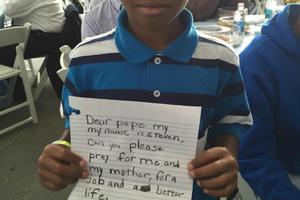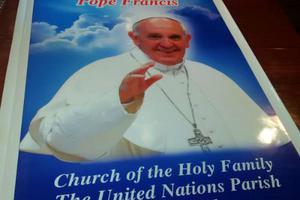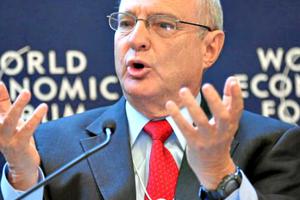New D.C. Archbishop Wilton Gregory Addresses Abuse Scandal, Pledges Honesty
In his homily, the successor to Cardinal Donald Wuerl and former cardinal Theodore McCarrick acknowledged that ‘we clerics and hierarchs have irrefutably been the source of the current tempest.’

WASHINGTON — Archbishop Wilton D. Gregory was installed as the seventh archbishop of Washington Tuesday in a ceremony that comes at a turbulent time for the local Church under the cloud of his predecessors’ sexual abuse and cover-up scandals.
The newly-installed archbishop addressed the issue head-on in his homily, promising those gathered that he would be committed to transparency about his failings.
“I want to be a welcoming shepherd who laughs with you whenever we can, who cries with you whenever we must, and who honestly confesses his faults and failings before you when I commit them, not when they are revealed,” he said to loud applause from those gathered.
Archbishop Gregory’s appointment follows Cardinal Donald Wuerl’s resignation, which was accepted by Pope Francis last year after he came under scrutiny in the Pennsylvania Grand Jury report for his handling of sexual abuse allegations when he served as bishop of Pittsburgh from 1988 to 2006. Wuerl also faced criticism for initially denying that he knew of any sexual abuse claims against his predecessor Theodore McCarrick before later admitting that he had known of McCarrick’s sexual behavior with seminarians.
Cardinal Wuerl gave remarks at the beginning of the installation calling Archbishop Gregory a “faith-filled pastor,” and emphasizing that “Pope Francis sends us a bishop attuned to the signs of the times and endowed with great pastoral ability.” Cardinal Wuerl’s appearance in the procession entering and exiting the installation Mass was met with more subdued applause than that which greeted Archbishop Gregory.
‘Waves of Unsettling Revelations’
Archbishop Gregory centered his homily on the Gospel account from Mark of Christ calming the stormy sea.
“We have been tossed about by an unusually turbulent moment in our own faith journeys recently and for far too long,” he said. “We clerics and hierarchs have irrefutably been the source of the current tempest.”
He referred to “waves of unsettling revelations” that “have caused even the heartiest among us to grow fearful.”
“I confess that I don’t possess the words to put every soul at ease, to assuage every fear, to lessen every pain,” Archbishop Gregory acknowledged. “But I do remind you — even as I sometimes have to remind myself — that he is here. He is here when the seas are calm, and he is here during every moment of uncertainty, anger, fear and shame.”
“He invites us to place our trust in him — not in trite and easy programs — but in him and him alone,” he emphasized.
Archbishop Gregory did acknowledge Cardinal Wuerl as a “cherished friend” and “a true Christian gentleman” in his remarks.
The installation Mass, held at the Basilica of the National Shrine of the Immaculate Conception, was presided over by the apostolic nuncio, Archbishop Christoph Pierre, and attended by eight cardinals, 50 bishops, 100 deacons and 300 priests.
The cardinals in attendance included Cardinal Blase Cupich of Chicago and Cardinal Joseph Tobin of New Jersey. Former apostolic nuncio Archbishop Carlo Maria Viganò alleged in his bombshell letter on the sexual abuse scandal that the now-laicized McCarrick was instrumental in the appointments of Cardinals Cupich and Tobin to the office of cardinal.
Retired Cardinal Roger Mahony of Los Angeles was also in attendance and drew attention due to his own alleged cover-up of sexual abuse cases that led to his being relieved of his duties in 2013.
A Healing Process
Msgr. Charles Pope, pastor of Holy Comforter-Saint Cyprian Church in the archdiocese and a contributor to the Register, said that he felt Archbishop Gregory struck a good tone in his homily in light of the sexual abuse scandals plaguing the Church.
“I really thought it was a very appropriate homily,” he said, “very beautiful, full of hope … he wasn’t too dark about the past but he was clear about it and he’s saying that the Lord’s been with us the whole time.”
Linda Simpson, a parishioner at Holy Comforter-Saint Cyprian who attended the Mass, told the Register that there is a lot of “hurt” over the abuse scandal, but “as he said, we have to move forward and hopefully with him as the shepherd and Jesus as the Good Shepherd we can begin to heal and we can begin to walk in faith.”
Shirley Austin, another parishioner at Holy Comforter-Saint Cyprian, agreed that “this is the beginning of the healing process for a lot of people.”
Archbishop Gregory, who is 71, is the first African-American archbishop in charge of the Archdiocese of Washington.
Valerie Washington, the executive director of the National Black Catholic Congress, told the Register that her organization is “thrilled” to have Archbishop Gregory in D.C. and that he is “a wonderful man.” She described him as “very transparent,” adding that “in addition to all the abilities that he has, he’s very pastoral, which is what the people need.”
Regarding his mention of the abuse scandal in his homily, Washington said she liked “the way he addressed it because it’s on many people’s minds and he knows what he’s stepping into with his predecessors.”
She emphasized Archbishop Gregory’s past experience as president of the United States Conference of Catholic Bishops from 2001 to 2004, when the national sexual abuse scandal first emerged into public light, and his work implementing the Dallas Charter for the Protection of Children and Young People.
“He’s dealt with this before so he was just being transparent he just wasn’t going to sugarcoat anything,” Washington said. “Everybody knows what’s happened.”
Lauretta Brown is the Register’s Washington-based correspondent.
- Keywords:
- washington, d.c.
- wilton gregory
















